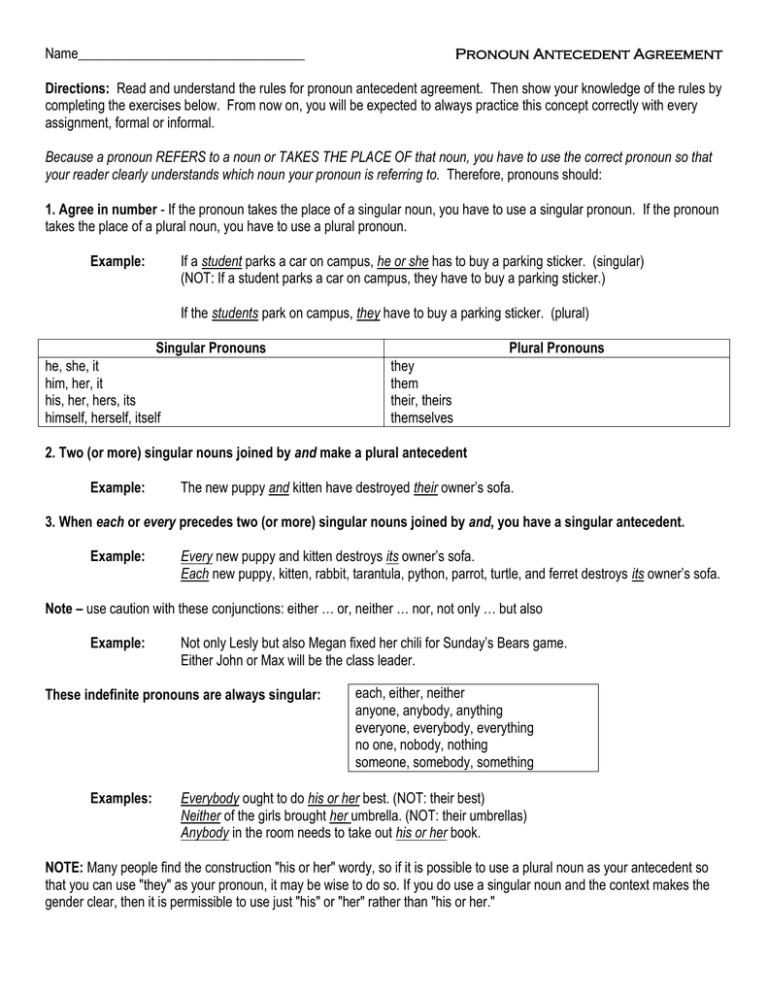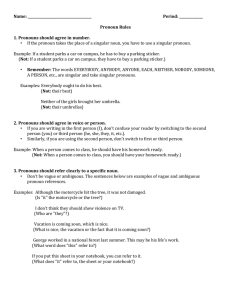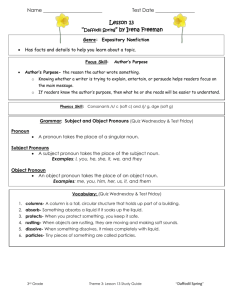Name_________________________________ Pronoun Antecedent Agreement
advertisement

Name_________________________________ Pronoun Antecedent Agreement Directions: Read and understand the rules for pronoun antecedent agreement. Then show your knowledge of the rules by completing the exercises below. From now on, you will be expected to always practice this concept correctly with every assignment, formal or informal. Because a pronoun REFERS to a noun or TAKES THE PLACE OF that noun, you have to use the correct pronoun so that your reader clearly understands which noun your pronoun is referring to. Therefore, pronouns should: 1. Agree in number - If the pronoun takes the place of a singular noun, you have to use a singular pronoun. If the pronoun takes the place of a plural noun, you have to use a plural pronoun. Example: If a student parks a car on campus, he or she has to buy a parking sticker. (singular) (NOT: If a student parks a car on campus, they have to buy a parking sticker.) If the students park on campus, they have to buy a parking sticker. (plural) Singular Pronouns he, she, it him, her, it his, her, hers, its himself, herself, itself Plural Pronouns they them their, theirs themselves 2. Two (or more) singular nouns joined by and make a plural antecedent Example: The new puppy and kitten have destroyed their owner’s sofa. 3. When each or every precedes two (or more) singular nouns joined by and, you have a singular antecedent. Example: Every new puppy and kitten destroys its owner’s sofa. Each new puppy, kitten, rabbit, tarantula, python, parrot, turtle, and ferret destroys its owner’s sofa. Note – use caution with these conjunctions: either … or, neither … nor, not only … but also Example: Not only Lesly but also Megan fixed her chili for Sunday’s Bears game. Either John or Max will be the class leader. These indefinite pronouns are always singular: Examples: each, either, neither anyone, anybody, anything everyone, everybody, everything no one, nobody, nothing someone, somebody, something Everybody ought to do his or her best. (NOT: their best) Neither of the girls brought her umbrella. (NOT: their umbrellas) Anybody in the room needs to take out his or her book. NOTE: Many people find the construction "his or her" wordy, so if it is possible to use a plural noun as your antecedent so that you can use "they" as your pronoun, it may be wise to do so. If you do use a singular noun and the context makes the gender clear, then it is permissible to use just "his" or "her" rather than "his or her." 4. Agree in person - If you are writing in the "first person" (I), don't confuse your reader by switching to the "second person" (you) or "third person" (he, she, they, it, etc.). Similarly, if you are using the "second person," don't switch to "first" or "third." Example: When a person comes to class, he or she should have his or her homework ready. (NOT: When a person comes to class, you should have your homework ready.) Directions: Select a personal pronoun that agrees with the subject of each of these sentences. Write your answers on the lines. Ex: The group has its meeting here. 1. Anyone can get ________________ name in the news. 2. None of the checks were cashed; ________________ finally expired. 3. The chef cut ________________ thumb while peeling carrots. 4. A person should insure ________________ valuables. 5. The family has ________________ eye on a new house. 6. The code breakers shared ________________ secrets. 7. Everybody has ________________ own dreams and goals. 8. One can be happy only if ________________ has respect for ________________. 9. My mother and her sister took ________________ vacation together. 10. Children never realize how loud ________________ can be. Directions: Correct the sentences below to show proper pronoun-antecedent agreement. You may add or change words as needed. If sentences are correct as they are, write correct next to the sentence. 1. One of the boys had tears in their eyes. 2. Somebody left their books on the counter. 3. A student should see an advisor if they have any questions. 4. A student should see an advisor if you have questions. 5. Many of us love the movies, but you seldom have time to go to them. 6. Everyone has his or her own way of studying. 7. Teachers are responsible for providing his / her students with accurate grades. 8. Someone had blocked the driveway with their car. 9. When I asked why I failed the test, he said that I had not studied the proper material. 10. Each woman must do their best to take care of their health.



